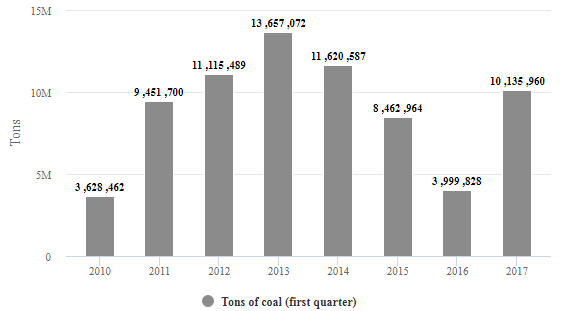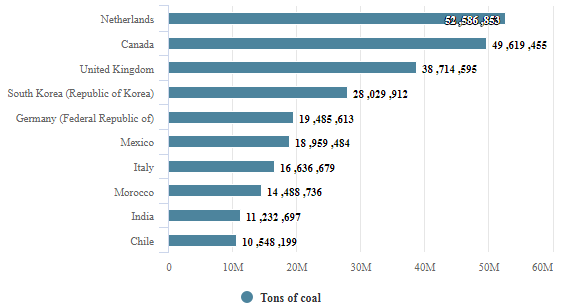Ukraine Coal Shipments Show How Doors Can Open for Exports

By Daniel Moore
August 15, 2017 - In 2014, when fighting broke out in the eastern parts of Ukraine, much of the world was focused on the stakes for Russia, Europe and the United States.
But for a small electric utility based in Ukraine’s capital city of Kiev, the alarm quickly turned local: Fighting had blocked access to its precious coal mines used to power three plants.
The dilemma laid the groundwork for an agreement, three years later, with Latrobe-based Xcoal to supply 700,000 tons of Pennsylvania coal to Ukraine, parts of which are still controlled by pro-Russian separatists. The deal, announced last month, marks the first major shipment of U.S. coal destined for power plants in the restive country in Eastern Europe.
The deal showed how doors can open for companies looking to export goods and services. It also raised the profile of the U.S. Commercial Service, a branch of the U.S. Department of Commerce that works with thousands of American companies to promote trade deals worth billions of dollars every year.
The coal sale — hailed by top government officials as a significant political achievement — came together behind the scenes relatively quickly, according to Commercial Service officials and some of the companies involved. And it was just one of the 14,000 export transactions organized by the service each year, mainly for small businesses working in industries such as agribusiness, education, environmental services and health technologies.
“We’re all constantly on the lookout for opportunities, whether it’s demand-driven or having companies interested in finding new markets,” said Ryan Russell, one of three Pittsburgh-based senior international trade specialists with offices Downtown.
The Commercial Service employs a global network of more than 1,400 trade experts in 100 regional offices across the United States and in U.S. embassies and consulates in 75 countries around the world. It traces its origins to the early 1900s, when the industrial revolution led to increased flow of goods and services to other nations.
With the proliferation of international trade deals in the late 20th century — the U.S. has free trade agreements with 20 countries — the agency took on a more prominent role. Its commercial officers abroad are considered diplomats, which mean businesses have the ear of people stationed in any particular country.
“Being a part of the U.S. foreign government presence lends a lot of weight,” Mr. Russell said.
Coal for Power
The Commercial Service has been keeping an eye on the opportunity to sell coal to foreign countries for a while. This year, foreign buyers have provided a boost to American coal as demand from U.S. power plants continues to dry up.
In the first three months of this year, exports of coal are up about 58 percent compared with the same period one year ago, according to a Post-Gazette analysis of the most recent data gathered by the U.S. Energy Information Administration. First-quarter shipments of coal specifically to foreign power plants have more than doubled from the previous year to 10 million tons.
Foreign Buyers Warm to U.S. Coal
Coal shipments destined for power plants around the world jumped by more than 150 percent in the first three months of 2017, compared with the same period one year ago.

Exports of steam coal during the first quarter of each year; from January to March.
Source: U.S. Energy Information Administration
The Biggest Buyers
Though exports tend to vary sharply from year to year, foreign power plants in thesecountries have purchased the most U.S. coal since 2008.

Source: U.S. Energy Information Administration; graphic: James Hilston/Post-Gazette
Centrenergo, the Ukrainian power utility, had approached U.S. embassy officials in Kiev in 2014 looking for sources of coal. Centrenergo could not be reached for comment, but a media release from September 2014 noted “numerous destructions and damages of electrical networks and infrastructure, property and equipment of coal mines, transportation infrastructure.”
The United States was not selected to provide the first batch of coal, but the Commercial Service — working alongside the U.S. Department of Energy — stayed in touch.
Centrenergo was specifically looking for anthracite, a type of coal produced on a small scale in eastern Pennsylvania. With a high carbon content, it burns hotter than bituminous coal — mined in Western Pennsylvania — but is less abundant and costlier to mine.
Today, anthracite survives on use primarily in steel mills, wastewater treatment plants, sugar beet refining, home heating in rural areas — and even coal-fired pizza joints.
“This is a portion of the coal industry that has struggled, I think everyone would say that,” said Greg Driscoll, president and chief executive officer of Blaschak Coal Corp., based in Schuylkill County. Mr. Driscoll and some other anthracite mine owners first met with Centrenergo officials in June, a meeting that was set up by the Commercial Service.
“Their need was way beyond any one company here,” he said. Blaschak Coal sells about 350,000 tons of coal each year and employs 150 people.
Xcoal, one of the leading coal exporters in the country, ended up taking the lead in gathering the coal for the Ukraine deal, and Blaschak sent 4,000 tons in the first batch. The contract lasts through the end of this year.
Centrenergo now has direct contacts with XCoal, and the government is not directly involved anymore, Mr. Russell said.
Asking Questions
Although the Commercial Service sometimes works in areas considered unstable, Mr. Russell said most companies are usually concerned only about possible disruptions to deliveries. Exporting products is often no more risky than selling them domestically, he said, and there are plenty of U.S.-backed and private insurance policies that cover losses due to political instability.
Businesses in the Pittsburgh region can reach out to the Commercial Service through one of the trade specialists, who promote exports in specific industries.
“Companies will come to us with questions about a particular country’s political and economic environment, what it’s like doing business there,” Mr. Russell said.
One company that has frequent questions is Cranberry-based Preservation Technologies, which produces a chemical system that removes acid from paper to preserve books and documents.
In addition to preserving more than 4 million books and documents for the Library of Congress, the company has seen heavy demand from areas of the world where current or future conflict could threaten records and archives.
It operates facilities in Slovenia, South Africa, South Korea and other countries, said James E. Burd, president and chief executive officer. It is looking at expanding to China, Nigeria and Qatar. Recently, it inked a deal with a Russian company to move one of its facilities from Spain to Moscow.
“My first phone call is always to those guys,” he said of U.S. Commercial Service. “We need to sort out what’s going on in those countries, and we can’t do it. We’re too small.”

